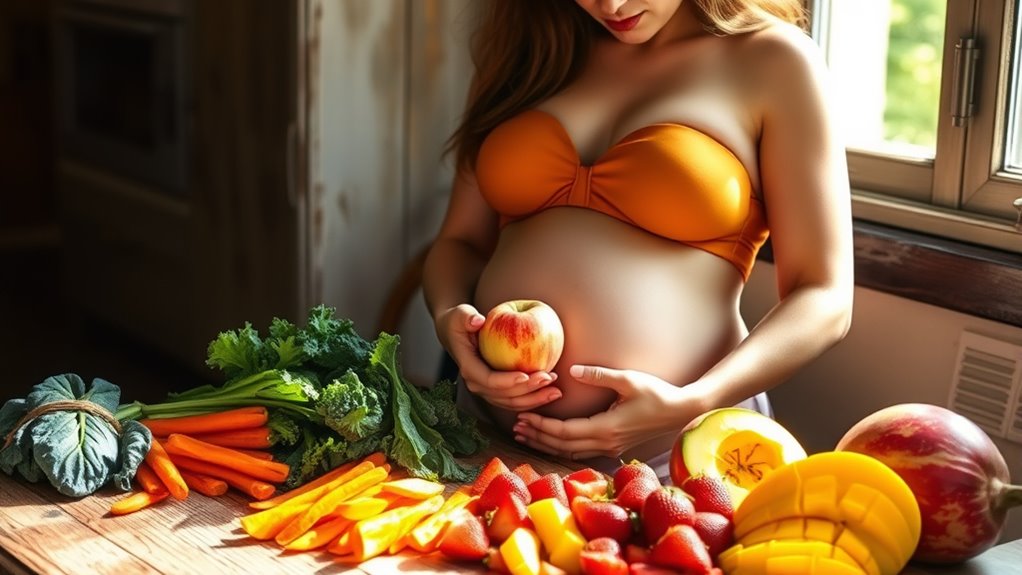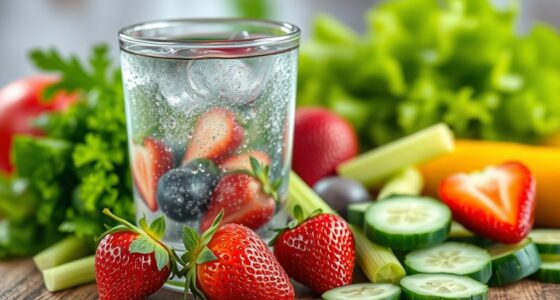If you’re considering a raw food diet during pregnancy, focus on selecting fresh, high-quality ingredients, thoroughly washing all produce, and proper storage to minimize risks. Avoid raw animal products and be cautious with sprouts, which can harbor bacteria. guarantee your diet is balanced with nutrient-dense foods, and consider supplements if needed. Staying vigilant about food safety helps protect you and your baby; exploring more can guide you safely through this journey.
Key Takeaways
- Prioritize thoroughly washing and proper handling of raw produce to reduce bacteria and pesticide exposure during pregnancy.
- Avoid raw animal products and sprouts to lower the risk of listeria and other foodborne illnesses.
- Incorporate a variety of nutrient-dense raw foods to meet pregnancy-specific vitamin and mineral needs.
- Use proper refrigeration and food safety practices to prevent spoilage and bacterial growth of raw ingredients.
- Consult healthcare providers for personalized guidance on raw food consumption and potential supplementation during pregnancy.

Have you ever wondered what it’s like to navigate the world of raw foods while pregnant? It can feel overwhelming to balance your desire for fresh, wholesome meals with the need to keep your baby safe. When you’re on a raw food diet, ensuring nutritional balance becomes critical because raw foods can be packed with vital nutrients, but they also pose certain risks if not handled properly. Your goal is to enjoy the benefits of raw produce, nuts, seeds, and sprouts while minimizing potential dangers. To do this, you need to be vigilant about food safety, which is especially important during pregnancy when your immune system is naturally more vulnerable.
First, focus on selecting high-quality, fresh ingredients. Organic produce is often preferred because it tends to be free from pesticides and harmful chemicals, which is an added layer of safety. Wash all fruits and vegetables thoroughly under running water, and consider using a brush for produce with thicker skins. This simple step helps remove surface bacteria, dirt, and pesticide residues, reducing your risk of foodborne illnesses. When it comes to nuts, seeds, and sprouts, proper handling is essential. Soaking and sprouting seeds can increase their digestibility and nutrient availability, but you must do it safely. Make sure to rinse them well and keep them refrigerated to inhibit bacterial growth. Additionally, food safety practices such as proper storage and handling are vital to avoid contamination.
Choose organic produce, wash thoroughly, and refrigerate nuts and sprouts to ensure safety during pregnancy.
In terms of nutritional balance, incorporating a variety of raw foods ensures you’re covering essential nutrients like vitamins, minerals, and healthy fats. Leafy greens, colorful vegetables, and fruits provide antioxidants and fiber, while nuts and seeds supply healthy fats and protein. However, pregnancy requires specific nutrients such as folic acid, iron, and calcium, which may be more challenging to obtain from a raw diet alone. Consider adding fortified foods or supplementing your diet after discussing it with your healthcare provider.
Food safety goes beyond just washing and proper storage. Be cautious about raw animal products, which are generally not recommended during pregnancy due to the high risk of listeria and other bacteria. Stick to plant-based raw foods and cooked options for meats and dairy. Always listen to your body and avoid any raw foods that seem questionable or have an unusual odor or appearance.
Balancing your raw food diet with food safety practices ensures you nourish your body and protect your developing baby. By choosing fresh, high-quality ingredients, maintaining proper hygiene, and being mindful of your nutritional needs, you can enjoy a raw lifestyle during pregnancy without compromising safety or health.
Frequently Asked Questions
Can Raw Foods Cause Food Poisoning During Pregnancy?
Yes, raw foods can cause food poisoning during pregnancy because they may contain foodborne pathogens that aren’t destroyed without cooking. Consuming contaminated raw produce or meats increases your risk of infections that could lead to serious pregnancy risks, like miscarriage or preterm labor. To stay safe, avoid raw or undercooked foods, wash produce thoroughly, and choose pasteurized options whenever possible. Your health and your baby’s safety depend on it.
Which Raw Foods Are Safest for Pregnant Women?
Ever wonder which raw foods are safest during pregnancy? To minimize risks, focus on superfood varieties like organic fruits, vegetables, and nuts, which often have lower contamination chances. Always wash produce thoroughly, peel when possible, and follow food safety tips like avoiding high-risk items such as unpasteurized dairy or raw seafood. By choosing carefully and practicing good hygiene, you can enjoy raw foods while keeping your pregnancy safe.
How Can I Ensure Adequate Nutrition on a Raw Diet?
To make certain of adequate nutrition on a raw diet, focus on smart meal planning that includes a variety of fruits, vegetables, nuts, and seeds. Incorporate leafy greens and colorful produce to cover essential vitamins and minerals. You might also need to supplement with vitamin B12, iron, and omega-3s, as these can be harder to obtain from raw foods alone. Regularly consult with a healthcare professional to tailor your diet to your needs.
Are There Specific Raw Foods to Avoid While Pregnant?
Your concern about raw food safety during pregnancy is vital—it’s like walking a tightrope over a canyon! You should avoid raw fish, unpasteurized dairy, raw eggs, and sprouts, as they pose high risks for foodborne illnesses. Focusing on safe, nutrient-dense options helps maintain pregnancy nutrition without jeopardizing your health. Always consult your healthcare provider to tailor a diet that keeps you and your baby safe and thriving.
How Does a Raw Diet Affect Fetal Development?
A raw diet can impact fetal development by affecting nutrient absorption, which is crucial for healthy fetal growth. Consuming unpasteurized or undercooked foods may introduce risks, potentially leading to deficiencies or infections that hinder development. You need to guarantee you’re getting essential nutrients like folate and iron. Properly balancing raw foods with safe preparation methods helps support your baby’s growth while minimizing health risks.
Conclusion
Embracing a raw food diet during pregnancy is like tending a delicate garden—you need patience, care, and a gentle touch. Trust your instincts and listen to your body’s whispers. With mindful choices, you’ll nurture your little sprout with vibrant, fresh nourishment. Remember, every bite plants seeds of health and happiness for both of you. Stay curious, stay gentle, and watch your shared journey blossom into a beautiful, nourishing adventure.










